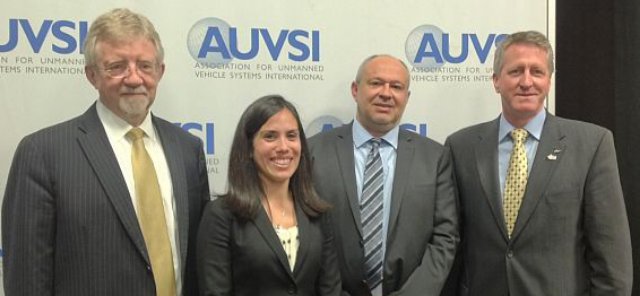 A small but growing group of industry professionals have signed a Memorandum of Understanding (MOU) establishing the International Consortium of Aeronautical Test Sites (ICATS).
A small but growing group of industry professionals have signed a Memorandum of Understanding (MOU) establishing the International Consortium of Aeronautical Test Sites (ICATS).
At AUVSI’s Unmanned Systems conference in Orlando this month, representatives of the UAV test & service centre (CESA) in Bordeaux, France; the Oklahoma State University – University Multispectral Laboratories in Oklahoma, United States; the National Aeronautical Centre in Wales, United Kingdom; and the UAS Centre of Excellence in Alma, Quebec, Canada formally signed and celebrated an MOU that consolidates various MOUs signed between the Centers in the past two years, officials say.
The mission of the individual test sites is to develop international centers of expertise focused on the development, applications, and operations of unmanned aircraft systems (UAS) and remotely piloted aircraft systems (RPAS). By joining forces in the consortium, the test centes aim to support and guide the industry in the development, operations, and certification of UAS/RPAS as established by their respective regulating bodies. ICATS will also focus on cross-borders normalization of training and licensing, as well as airspace management and regulations.
The test sites aim to engage with private, academic, and public sector partners, as well as experts from around the world, to develop new business opportunities in the field of UAS/RPAS operations. They also will support research and development activities; create jobs; promote investment; develop and commercialize advanced technologies; and expand existing services, both in their own countries and across borders.
The consortium will support the industry by enabling the development, testing, and ultimate certification of UAS/RPAS to enable their use in non-segregated airspace. It will be achieved by sharing information on operational safety, flight regulations, and, when allowed to do so, actual operational experiences. The test centers will help continue to bridge the gap between the establishment of regulations and actual operations, officials explain.
ICATS officials have received expressions of interest from several UAS/RPAS test sites in multiple countries. The consortium welcomes interest from all UAS test sites and encourages contact with the ICATS Director of International Relations, Dr. Stephen McKeever, Secretary of Science and Technology, State of Oklahoma.
Unmanned Aerial System Centre of Excellence
The Unmanned Aerial System Centre of Excellence is a non-profit organisation whose mission is to develop an international centre of expertise and innovative services in the design, operations and applications of UAS. The UAS CE counts sixteen members in its ranks plus an important network of international partners.
Oklahoma State University – University Multispectral Laboratories
Government-owned, contractor-operated (GOCO), the University Multispectral Laboratories (UML) is a not-for-profit trusted-agent institution owned by Oklahoma State University and operated by Cherokee Nations Research Laboratories. UML provides research, development, test, evaluation and training (RDT&E) laboratory and field facilities in support of C5ISR, cyber, UAS, energy, and related missions across all federal, state, local and commercial requirements.
UAV test and service center (CESA)
The CESA, the first French civilian UAS testing zone, is a result of collaboration between the Regional Council of Aquitaine, the State, the French civil aviation authority (DGAC) and the Ministry of Defense. Managed and operated by the Bordeaux Technowest technopole, CESA will soon allow certification and qualification of autonomous systems of less than 150 kg.
National Aeronautical Centre (NAC)
The National Aeronautical Centre (NAC) is a unique location in the UK that enables the development, testing and demonstration of systems and technologies associated to the aeronautical industry. Its key feature is the world’s first area of restricted airspace designed specifically for military and civilian unmanned systems operations. This is enhanced by the facilities and organizations at the NAC, all of which deliver support to the sector’s most specialised working environment.
Source: Avionics Intelligence

